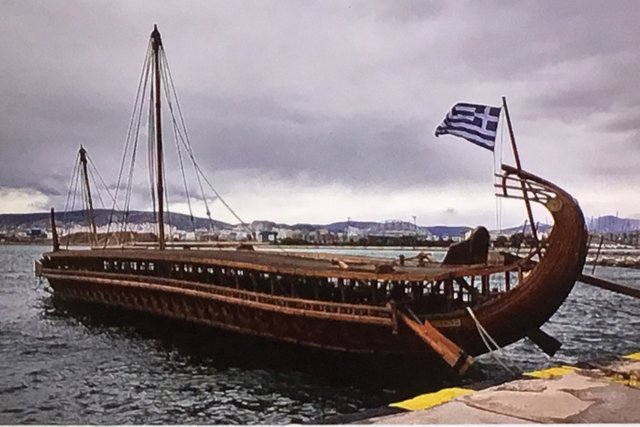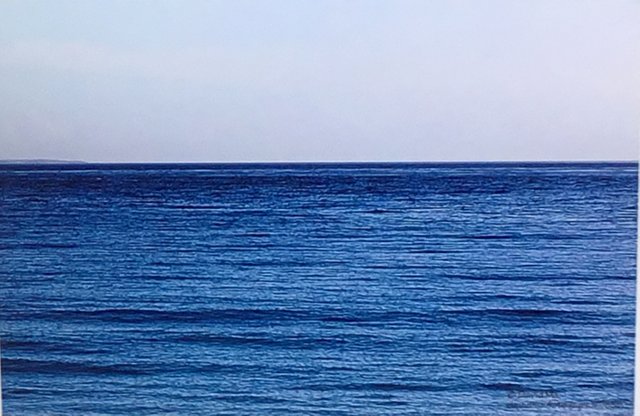The Rowers: An Allegorical Tale
THE ROWERS: AN ALLEGORICAL TALE
Once upon a time there was a mighty ship, powered not by sail or propeller but by human muscle. A great many oarsmen worked to move the ship through the waters of a vast ocean.
How big was this ocean? It covered such a vast expanse that several lifetimes were required to cross it. The people aboard that great ship knew this all too well. For generations they had travelled, ceaselessly pulling at the oars, moving the craft along. And in all that time, as seasons changed as and babies grew up to be adults who could replace those too frail with age to row anymore, the view hardly changed. Always, no matter which direction the eye looked, all there was to see was water, water, water, stretching all the way to the horizon.
Yet something, perhaps some ancient memory buried so deep it now manifested itself on the conscious as a vague yearning, insisted that there had to be more to this journey than an endless crossing of an ocean that just went on and on. That one day, there would be some sign that all this effort had at last been rewarded and a different life could begin.
But, here and now, everybody was raised to accept the situation. All aboard the ship had to keep rowing, keep moving the ship along, and this they would have to carry on doing until something changed, something that would indicate journey’s end.
Not that everybody rowed. A few took on the responsibility of coordinating the actions of the many who did row. They shouted out instructions and in heeding those orders the great mass of rowers worked as one, their oars rhythmically paddling, propelling the craft through the waters.
The instructors did not just issue orders to ensure the rowers worked proficiently. They also promoted an ideology based around the necessity to keep rowing. Most accepted this ideology as beyond question. Of course the fit and able had to pull an oar. Being a rower was what gave purpose to life. And think of all those who had previously pulled your oar. If the rowing were to stop now, all that our ancestors had struggled for would be for naught.
So they kept at it, rowing, rowing, rowing. Inevitably, the time would come for each individual when he or she could row no more, having finally reached a stage in their life when physical strength was no longer up to the task. A few became instructors. But mostly, these people, with great ceremony, were gently lowered overboard to be embraced by Poseidon, honoured for the rest of time in the memories of their descendants.
Then there were those who would not row, even though they were fit and able. For them, there was no ceremony for they had no honour. They were tossed overboard with all the dispassion with which one threw away garbage. Their cries as they floundered around in the waters, facing only death rather than the eternal embrace of the god Poseidon, served as warnings to those alive not to end up like that.
On and on the great ship travelled, seemingly without end. In fact, so many generations had passed by without knowing any other life that most saw no end to this existence even in their imagination. To be alive was to row. That was the purpose for which you had been born, to row, row, row until, finally, you earned the privilege of being embraced by Poseidon and remembered with honour.
But then, one day, there was a change. The view was not just of water stretching all the way to the horizon in every direction. There was something else out there, something nobody had witnessed for years beyond count. The people aboard the ship could put no name to this unprecedented sight, for they had long forgotten the name ‘land’. But as the land loomed ever larger, a feeling stirred in the heart. This had to be it, the journey’s end!
With a great whoop of joy the rowers pulled for the shore, working as hard as the instructors barked their orders. Near the shore, submerged just below the waves, there was a coral reef. In their eagerness to reach land the people sent the ship on a collision course with that reef. It tore a hole in the great boat’s hull and the ship began to sink. The waves pounded the wreck against rocks and razor-sharp coral, destroying it utterly before too long. But what did that matter? There, almost within touching distance, was journey’s end. Everybody leaped overboard and swam for shore. Powerful swimmers were they, having built up such muscular bodies from all that rowing.
The rowers stood on the shoreline and took in their surroundings. Everywhere they looked there was an abundance of foods and materials, enough to satisfy any need. Tears rolled down the eyes of those who contemplated a life lived doing something other than rowing.
But they were in a minority, and they had little authority to wield. The instructors did have authority and they were soon giving out orders. “Every man and woman of fit and able body is to procure for himself something like this”, they said in loud, clear voices, each holding up a branch of about two metres in length. So used to following the orders of their instructors were these people that just about everybody did as they were told.
Seeing the people now each had something that would serve for the purpose they knew had to be done, the instructors issued their next order. “You are to sit down, forming a single line, one person behind the other”.
The people did as instructed, each holding in their hand a pole-like object, feeling comfortable familiarity grasping that object and seeing in front of them the back of a person likewise holding their own pole.
“What are you?”, yelled the instructors?
“We are rowers!”, replied that great mass of people.
“What gives meaning to life?”, the instructors shouted.
“Rowing!”, came the reply.
“What would you do if you did not row?”, the instructors demanded to know.
It would be wrong, strictly-speaking, to say the reply was unanimous, but it very nearly was. And the near-unanimous reply was, “if we did not row we would have nothing to do”.
The instructors nodded sagely. The people had learned life’s lesson well. People rowed. It was what they always had done, it was what they always would do.
“Then...Pull! Pull! Pull!”.
And they did pull. They sat in rows, pulling their imaginary oars. Surrounding them was an island of abundant resources that could have permitted so many more purposes but they were blinded by an ideology that saw no purpose in life other than to row, and so row they did. Today. Tomorrow. Always.
Images from wikimedia commons.



A cautionary allegorical tale. Often we're too attached to our past to see the way to a better future. Very well written!
Thanks for the kind comments!
Excellent parable! It captures the hypnotism that has overtaken the world today. We are now on the shore of new understanding. We must stop blindly doing as our doctors and our other rulers tell us to do, even though their orders are killing us.
A very good fable.